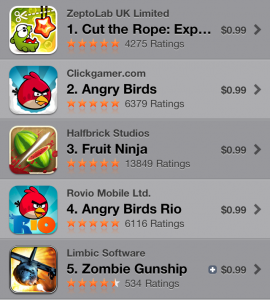In a move that many people might say is long overdue, Apple Inc. (NASDAQ:AAPL) has begun to actively crack down on people “gaming” app ratings on the App Store. One of the easiest ways for app developers to fool the rating algorithms is to make or purchase false positive reviews, so Apple is naturally pursuing this avenue vigorously. The problem had reached such proportions that many people reported viewing any five-star review as likely fake.
The loud complaints of many app developers, which began soon after Apple initiated its new cleanup effort, revealed that this was no mere posturing on the Cupertino company’s part, but an actual plan vigorously pursued. The developers all claimed that their reviews were legitimate and had been unfairly removed, while those of large, obvious violators were left undisturbed. Whether these complaints actual merit is unknown.
 Given that there are 1.2 million apps on the Store as of June 2014, and the half-million mark was passed years ago in October 2011 according to a collection of Apple announcements on the subject, individually checking the software programs is obviously out of the question. An automatic algorithm is involved in deciding which reviews are false and which are real, though its precise function remains unclear.
Given that there are 1.2 million apps on the Store as of June 2014, and the half-million mark was passed years ago in October 2011 according to a collection of Apple announcements on the subject, individually checking the software programs is obviously out of the question. An automatic algorithm is involved in deciding which reviews are false and which are real, though its precise function remains unclear.
Of course, fighting false reviews and the undeserved ratings they produce is an uphill battle, and even though Apple (AAPL) is pursuing it strongly, it is not yet victorious in any sense of the word. The App Store is still haunted, and perhaps dominated, by large numbers of apps whose main claim to fame is spurious positive reviews purchased online by the developers. However, Apple is at least making an effort to clean up, rather than letting the “law of the jungle” reign.
It is interesting to speculate whether the iOS game sensation “Flappy Bird,” created by Vietnamese programmer Nguyen Ha Dong, would ever have achieved its astounding success under Apple’s (AAPL) currently more watchful eye. Some commentators have defended Nguyen’s avian triumphs, stating that the game really is fun and addictive enough to generate the prominence it achieved without “gaming” the system.
Others, less charitably, have provided detailed breakdowns of why they believe the Flappy Bird phenomenon was largely a product of bots and various other methods of fooling Apple’s rating algorithms. The facts of the matter will be put to the test when the new multiplayer Flappy Bird debuts in August, however. With Apple’s new determination to increase the honesty and accuracy of App Store ratings, the new Flappy will either flop, or prove that it can fly on its own two wings.



